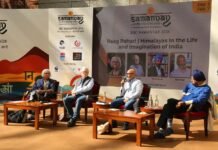Most speakers at the Wan-Ifra Digital Media India spoke about the skills that are need-ed to be learned by journalists to adapt to new technologies of the digital world. However, a key concern that also sur-faced at the Chennai conference was how to let the journalist do his tradi-tional job of news gathering and con-tent creation without turning him into a code writer or social media curator or accelerator.
Though there were no pre-sentations on that issue, Indian Printer and Publisher spoke to the half-a-dozen digital solution providers present at the conference to find some answers.
Software-managed delivery
The life and role of a journalist is chang-ing. At present he is learning tools for publishing content to various platforms and devices and accelerating his content to increase the reach and improve deliv-ery.
Perhaps in the future, software will take care of multi-format publishing and the journalist will concentrate only on his core functions of news gathering, writing good stories and taking good pic-tures.
At the Wan-Ifra Digital Media In-dia, ppi Media’s CEO Norbert Ohl, and vice president of international sales Ger-hard Raab shared some insights of how their company is developing software for modern multi-platform integrated news-rooms to bring the future closer.
“Surely there will be a few experts in the newsroom who will know it all to cre-ate new ideas and think, develop, mon-itor and measure the process, but jour-nalists by and large would be spared from the hassles of multi-format pub-lishing and the technicalities that go be-hind an integrated newsroom,” says ppi Media.
On the sidelines of the Chennai conference, Ohl and Raab said that ppi has devised software that permits multi-format publishing without the journal-ist having to bother about page designs and layouts, tagging, coding or even tweeting or Facebook sharing. One would be able to directly publish to twit-ter, website or newspaper the same con-tent that a journalist has created — from a single publishing point — automati-cally, without deploying independent people or spending journalists’ time.
Bangkok Post takes lead in Asia
Though ppi has plenty of clients across Asia, only Bangkok Post has adopted its integrated software for multi-platform publishing. It is however used by many western publishers including the Ger-man publishing giant Axel Springer group which is an early adopter.
In In-dia, ppi sells both editorial as well as ad-vertisement-related software for print to a few media houses as well as applica-tions for web and the mobile platforms. Although at present no Indian newspa-per has opted for its integrated solution, ppi says it is in conversation with some major publishers.
ppi’s current clients in the country are The Times of India and The Hindustan Times in English and Malayala Manora-ma and Mathrubhumi in Malayalam. “They all have been using some or the other solutions of ppi Media for years and we eventually aim to convince one of them to go in for an integrated solu-tion that is tailor-made for their news-room to cut effort as well as costs,” says Raab.
When asked whether a ROI ex-ercise has been done on integrated newsrooms with cost versus benefit eval-uation, Raab said that since every news-room has different needs, it is a difficult exercise because the ppi software has to be tailored to suit the needs of the clients newsroom rather than the jour-nalists having to work as per the re-quirements of the software


















